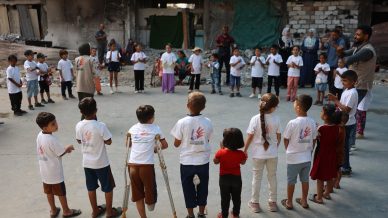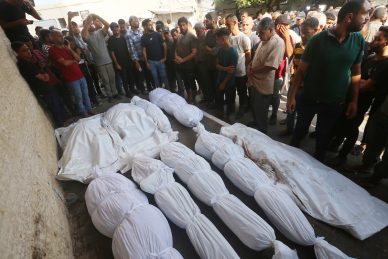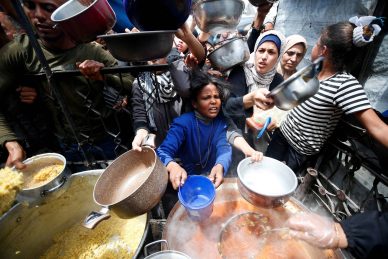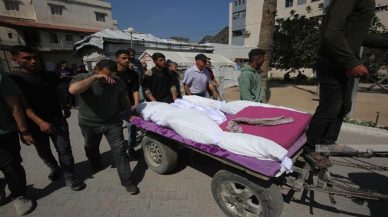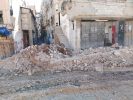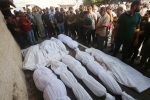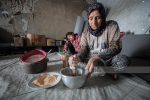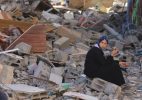GAZA, (PIC)
Maha Othman wonders how she can keep her four children away from the bacterial infection they have contracted, as sewage water flows between the tents of the displaced, and piles of garbage accumulate along the streets.
She adds that her four children are suffering from severe skin diseases, and the doctors have informed her of a bacterial infection caused by pollution. She asks: “How can I keep my children from getting sick in this miserable situation?”
Walking through the streets of the Gaza Strip from north to south, one can see with his/her own eyes the widespread sewage pools that have caused major health nuisances, clogging nostrils, and health disasters that international and United Nations health organizations have repeatedly warned about.
On 24th Street in the city of Deir Al-Balah in central Gaza Strip, one of the most important streets in the city teeming with hundreds of thousands of displaced people, the sewage water almost prevents movement in the vital street, as the sewage flows strongly.
The situation in the other streets of the smallest cities in the Gaza Strip is similar, as hardly any alley is free of sewage pools, where the polluted water has attracted flying insects, most notably mosquitoes, worms and other crawling insects that have crept into the tents of the displaced, ruining their bitter lives.
Othman (45 years old), a displaced person on Al-Nakheel Street west of Deir al-Balah in the center of the Strip, says that she lives in a tent surrounded by sewage water and waste everywhere. “The wastewater flows into the tent, we cannot stand the emanating odor, our children are sick, clean water is scarce, our lives are tragic.”
Othman complains about the repeated infection of her children with severe skin diseases, and the doctors have told her that this is due to a bacterial infection caused by pollution, and that she must take care of their personal hygiene.
The lady wonders how she can do that with the scarcity of clean water and bathing facilities, as the children play and roam between the tents, as they find no space to play except in these areas due to the severe overcrowding.
Since the beginning of the Israeli war of extermination on Gaza, health, human rights and United Nations organizations have warned of the spread of diseases and epidemics among the displaced due to overcrowding and the deterioration of personal hygiene.
The World Health Organization has revealed the presence of the poliovirus in the sewage, which portends a horrific health disaster.
The Deir Al-Balah Municipality confirms that the sewage networks were targeted and destroyed by Israeli bombardment in the city and the rest of the Gaza Strip governorates, creating health and environmental disasters and contributing to the spread of diseases and insects that transmit skin and epidemic diseases.
Municipality sources told the Palestinian Information Center that the huge number of displaced people put tremendous pressure on the city’s sewage networks, causing some of them to go out of service.
They also pointed to the occupation army’s deliberate targeting of municipal crews to prevent them from carrying out their duties, as part of a systematic policy of genocide.
Sewage water is a direct cause of the spread of hepatitis A, with the UNRWA recording hundreds of citizens being infected with the disease weekly due to the mass displacement, overcrowding of shelters, and lack of clean water and personal hygiene products, which the occupation prevents from reaching the Gaza Strip.
The UNRWA health program monitors 800 to 1,000 citizens being infected with type 1 hepatitis weekly across Gaza.
Dr. Mohamed Abdel-Moneim from the Medical Center in the displacement camp says that sewage water interacts with drinking and domestic water, being a direct cause of many skin and respiratory diseases, warning of a new environmental disaster in the displacement camps regarding the spread of scabies.
He says, “The displacement camps are facing an epidemic disaster related to the spread of scabies due to the horrific population density.”
Abdel-Moneim attributed the spread of scabies to the formation of sewage water pools, which provide a fertile environment for the breeding of the scabies mite, in the absence of spraying wastewater outlets with chemicals for more than 10 months.
He adds, “For 9 months, no local, international or civil authority has pumped sewage water to the treatment plants due to the electricity outage, nor have they sprayed sewage water accumulations and pools, leading to the spread of scabies.”

The doctor points out that the drug stores are suffering from the depletion of about 13 types of treatments for skin diseases, and that they only receive the product used to treat scabies every 20 days, with only 2 liters.
He continues, “This product could save an entire camp from scabies, but one liter is barely enough for 5 days, forcing us to dilute it so that more patients can benefit.”
Waste accumulation
Mahmoud Al-Jibali from the city of Gaza complains about the accumulation of garbage in front of his house, and the spread of insects and different types of mosquitoes that they are not used to, noting that mosquito bites cause skin irritation and skin swelling like burns.
Al-Jibali (37 years old) adds that his children have been affected by difficult skin diseases due to the insects that multiply in the garbage accumulations, “in addition to our feeling of suffocation at night due to the smell of sewage, as the smell starts to seep into our nostrils in the evening hours and we cannot stop it.”
Al-Jibali appealed to the whole world to save them from the tragedy and pain they are experiencing, saying, “We are killed by missiles and bombs morning and evening, and now we are killed by accumulated waste and garbage.”
According to the data of the Ministry of Health in Gaza, about 150,000 Palestinians, mostly children, suffer from skin inflammations ranging from scabies, chicken pox, lice, and ringworm, as well as other exhausting skin diseases, as a result of sewage overflow, pollution, lack of clean water, and lack of cleaning materials.
Asim Al-Nabih, the spokesman for the Gaza Municipality, says that garbage is multiplying greatly in front of shelters, displaced persons gatherings, and health centers, causing serious health problems.
He adds that the occupation has destroyed 126 heavy and medium-duty vehicles belonging to the Gaza Municipality since the start of the war of extermination, which has made it difficult for the municipality to work on waste collection.
He explains that the occupation army prevents the transfer of waste to the main landfill, which has led to the accumulation of about 150,000 tons of waste in the neighborhoods and streets of the city, affecting the safety and health of citizens and increasing the spread of rodents and insects, leading to the outbreak of epidemics and diseases.
Al-Nabih points out that the burning of waste is partially a solution, but it is not the appropriate solution, as the smoke resulting from the burning of solid waste and nylon causes respiratory diseases for citizens, “but we have no other options.”
He indicates that the occupation army directly and systematically targets the municipality and its employees, as dozens of municipal employees have been killed while at the work, as happened on August 14th with the employee Muhammad Jamal Al-Habash, who was martyred in an airstrike targeting the headquarters of the Gaza Municipality.
The elderly and children are the most affected by the deterioration of the health situation and the spread of diseases. United Nations agencies have repeatedly expressed their concern about the serious humanitarian health crisis brought about by the war and the Israeli siege on the Gaza population.
The United Nations Office for the Coordination of Humanitarian Affairs (OCHA) reports that during the entire month of June, Israel allowed the passage of less than half of the 115 planned humanitarian aid missions to northern Gaza.


